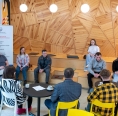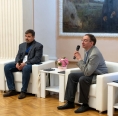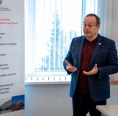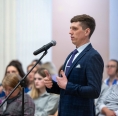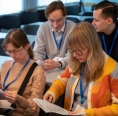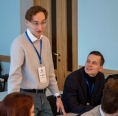-
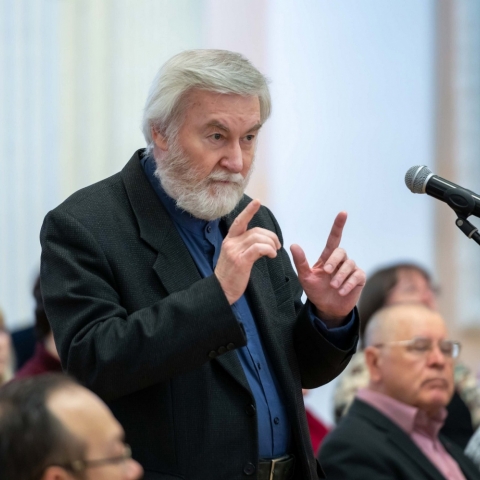
THE NEW WAVE
-
Address:
-
Partners:
What is the new way that Satkans have got to know their town along with the young scientists? What discoveries did they make? Why does our town look like a kind of a corporation to visitors? We’ve received the answers to these questions from the internship of students of the Philosophy Faculty of the M.V. Lomonosov Moscow State University. The visit took place in late March, with the support of Magnezit Group and the Satka District Development Assistance Fund.
Under the supervision of their teacher – Taras Varkhotov, Candidate of Science in Philosophy, Acting Head of the Department of Philosophy and Scientific Methodology, and the mentor of the master’s program Modeling of Sociocultural Processes – the young scientists were exploring the town’s space and associated social facts. Besides, the future philosophers had a number of meetings with representatives of the district administration, the Volfila philosophy club, managers and young professionals of Magnezit, and students of the A. K. Savin Mining and Ceramic College and secondary schools of Satka District. These meetings gave the researchers first-hand accounts of current problems and the residents’ concerns, as well as the residents’ views regarding the town’s future and things lacking in Satka at present.
The conversations also touched on historical and cultural memory and its preservation, as well as education, area improvement, etc. During their meeting with local residents who received higher education in a big city and then returned to their birth place, the Moscow University team tried to understand what was keeping people in our district. Most of the participants said that Satka had the ability to engulf and keep people there. It is a comfortable and convenient place to live: in big cities, travel from home to work takes an hour at least vs. 10 minutes in Satka. Besides, things feel so familiar and warm in Satka. Another argument, which came from young working people, was the accessibility of various leisure activities. You can team up with your friends and rent a tennis court or a catamaran for rafting, or go skating or get on a balloon and fly… And all this would cost your several times less than in major cities.
“We are constantly exploring major cities such as Moscow, Saint Petersburg, Yekaterinburg or Chelyabinsk. You can spend your entire life doing that and end up learning next to nothing about them. A small town is another matter. It’s much more interesting in that sense. It’s really possible to cover such town in its entirety over a certain period of time. For my students, the spring school in Satka is the first real experience of doing such work. And we are grateful to our hosts, including the management of Magnezit Group, for their trust and the opportunity they gave us,” says Taras Varkhotov. “Satka is unique. I first came here last year, during the 3rd All-Russian Scientific Conference Cinema in Digital Era. I was impressed. The residents’ interest in their town is go great. There’s such consistent and serious long-term work with history and the outlook. I’ve never seen this at such high a level before. I was also impressed with the fact that Satka has a philosophy club. Investing in urban infrastructure is one thing, but taking care of the resident’s communication and intellectual skills is quite a another. When the human potential develops, everything else follows. That’s why I was delighted to come back here and will come again.
During the meeting with the philosophy club, Aleksandr Rychkov, the Technical Director of Magnia Magnia company and the Science Director of the Free Philosophers Association of Satka said that the task set before the Moscow University team for their spring school required innovation.
” I’ve looked through all kinds of scientific work: dissertations, research articles, questionnaires. There is a lot of focus on the phenomenon of a small town from the philosophical and socio-cultural viewpoints. However, in this plethora of studies I haven’t found one that would look at the mining area, since all of them focused on Central Russia. That’s why what these kids and their mentor are going to get as a result of their work here will be of particular interest. It is not unlikely that the socio-cultural development model of Satka that they will present to us will be applied to other towns as well. Our town is known as the birth place of some federal projects, such as Strong Family and Universal Chess Education,” Aleksandr Rychkov said.
The MSU spring school team will shortly present their proposals on strategic planning of socio-cultural development of the town. Now, they are processing the material they collected over the course of their expedition. The preliminary findings of the study as well as some hypotheses regarding the life of the town were presented to Satka’s residents at the closing meeting at the municipal administration on March 29.
The students believe that Satka is a corporation town, where the role of the major industrial center is not just economic. The residents have contract with the industrial center in their social life as well as during their work. For instance, the college offers training in professions that Magnezit needs, while Magnezit itself helps its veterans and supports many events that take place in the town. One of the acute problems identified by the MSU students is the outflow of young people. The main cause of it is lack of prospects and opportunities for higher professional education. Another problem is that the old part of the town does not compare well with the downtown area. Meanwhile, there is a major historical component there, which has to be preserved. In addition, culture, tourism and sports sectors in Satka are developing at a high level.
“We are used to seeing many artists coming to our town. A visit of young scientists is a new wave and a new perspective. I have looked at Satka “from the outside” together with the MSU team and even made some discoveries. I didn’t know that that there was a prayer house of a religious organization in the building of the logging enterprise. I’m looking forward to seeing the results of this work,” said Marina Titova, a teacher of School No. 13.
Source: Magnezitovets. Photo by: Vasily Maksimov.
-
26.08 - 26.08
DIARY OF THE THIRD INDUSTRIAL BIENNALE
-
28.11 - 28.11
MY SATKA FESTIVAL WINS THE CONTEST OF CORPORATE VOLUNTEER PROJECTS
-
13.10 - 15.10
COOPERATION WITH VGIBL NAMED AFTER M.I. RUDOMINO

